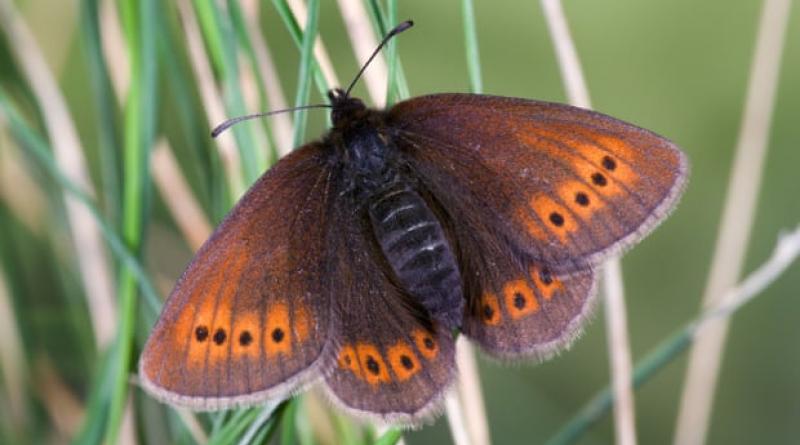Mountain butterflies 'will have to be relocated as habitats get too hot'.

Populations of mountain ringlet in Lake District face being wiped out as cooler habitats disappear.
The diversity and resilience of cold-loving butterfly species is threatened by global heating which will destroy genetically unique populations, according to a study.
Native mountain-dwelling butterflies such as the mountain ringlet, the bright-eyed ringlet and the dewy ringlet will have to be translocated to higher altitudes as their cooler habitat disappears to avoid extinction.
Populations of mountain ringlet in the Lake District are the most diverse in Europe after those in the western Alps, but they face being wiped out by global heating of 2–3C above pre-industrial levels. The species has already moved 130 to 150 metres uphill in Britain over the past five decades owing to climate change and it will eventually “run out of mountain”, researchers say, with no cooler, higher altitudes left.
According to University of York researchers, this species will have to be evacuated from the Lakes and moved to higher altitudes further north in Scotland, Scandinavia and the Alps.
Melissa Minter, of the University of York, who was the lead author of the study, published in Ecology and Evolution, said: “Genetic diversity is so important to the survival of a species, particularly in the face of climate change, because the greater the variation in genes, the more likely it is that individuals in a population will have the genetic capacity to adapt to changes in the environment.
“Our study shows how past climatic events have shaped unique genetic diversity across the populations of the mountain ringlet, and the impact that current and future climate change is likely to have.
“With the genetic diversity of cold-adapted butterflies so at risk in our warming world, conservationists may have to take more controversial steps – such as the relocation of populations – in order to ensure their long-term survival into the future.”
Researchers studied the DNA of more than 100 mountain ringlets caught in European mountain ranges this century and in England and Scotland since 2016. Less than 1% of any local population was taken for the study, with the permission of conservation authorities.
By tracking the genetic diversity of the mountain ringlet over 21,000 years, the study found that populations isolated in ice age refugia in different mountain areas have become increasingly genetically diverse.
Researchers discovered that the mountain ringlets in Scotland arrived from a different source to the mountain ringlets that colonised England, which are now found only above 500 metres in the Lake District.
These Lake District populations, which arrived during the retreat of the great ice sheets, are particularly genetically diverse. “If we lost the populations in the Lake District, we’d lose a large proportion of the genetic diversity across Europe,” said Minter.
It is thought highly unlikely that the Lake District mountain ringlets would be able to naturally disperse over the lowlands to find more suitable upland habitat in Scotland, and so the butterflies would have to be moved by conservationists to save their unique genetic diversity.
Translocation could lead to Lake District mountain ringlets mixing with Scottish mountain ringlets and creating a more robust butterfly better adapted to a hotter climate.
“However, there are risks in mixing two populations if they are quite different,” said Minter. “Sometimes when you breed different individuals that are genetically different, that can make them worse off and ultimately destroy that genetic diversity.”
While some translocations could take place into mountain ranges where there are currently no mountain ringlets, Minter suggested that translocations involving the mixing of populations might first require trial breeding in a lab to check that the butterflies were strengthened and not weakened.
Mike Morecroft, a climate change specialist for Natural England, said: “Climate change is one of the most serious challenges for nature conservation today and good science is essential to developing an effective response.
“Cold-loving species in the uplands, such as the mountain ringlet, are amongst the most vulnerable species to rising temperatures in England. This study provides a unique insight into the importance of local genetic diversity, which will help us to assess the best options to protect these species going forward.”
4 October 2020
The Guardian





